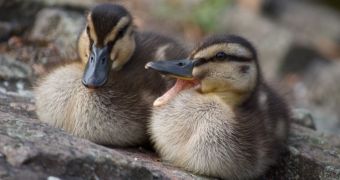People now know that the actions would-be mother take during pregnancy have a direct influence on how their baby turns out. But, while these correlations have been studied heavily in humans, experts have thus far paid little attention to what happens in the animal world.
A team of investigators from the Virginia Institute of Technology (MIT) is currently investigating this issue in baby ducklings.
The small creatures are extremely susceptible to falling prey to a large number of predators and various other environmental factors if their parents are not around.
But the older ducks apparently need to travel increasingly longer distances in order to get the food they need to sustain their youngster,
One of the direct consequences this type of behavior has is the fact that “egg sitting” time is getting shorter and shorter. The research team is looking into how this affects the little ducklings.
The work is conducted by experts from the Virginia Tech Department of Fisheries and Wildlife Sciences, experts at the US National Science Foundation (NSF) report.
“I guess everybody, from a human health perspective, knows that what a mother does during pregnancy can have all sorts of effects on her babies. We study how these little guys can be affected by the things that mom does,” says Bill Hopkins, who is an associate professor at the DFWS.
Hopkins and colleague Sarah DuRant, with funding from the NSF, are investigating a large number of ducklings, in hopes of determining how their mothers' actions influence them.
“How much time a female spends on her nest is going to influence the temperature that the nest is at,” explains DuRant, who is an ecologist at the university.
“What we're interested in are very, very subtle changes in temperature, maybe a degree Celsius at most,” Hopkins details, adding that he and his team are working hard on simulating such temperature variations in the lab.
The group says that reduced “egg-sitting” times have negative repercussions on the ducklings, and adds that these side-effects are immediately visible to the trained eye.
“They may look healthy, but if you actually dig a little deeper, we see a number of physiological deficits. Their immune systems aren't developing as rapidly,” Hopkins reveals.
“They appear to be almost developmentally stunted. “We see that they have changes in terms of endocrine function; in terms of stress hormones,” he adds.
“We see changes in thermoregulatory capacity and locomotor performance. They swim slower than the same individuals from the same clutch. Swimming is a critical part of their early survival. They've got to avoid predators,” the expert concludes.

 14 DAY TRIAL //
14 DAY TRIAL //